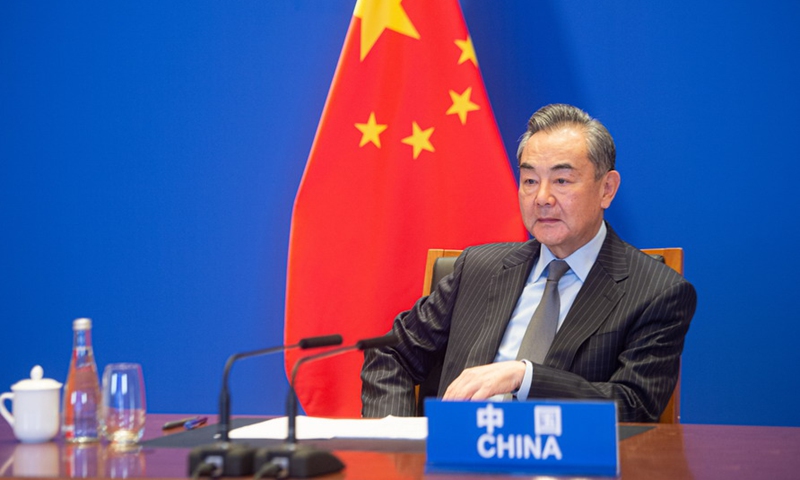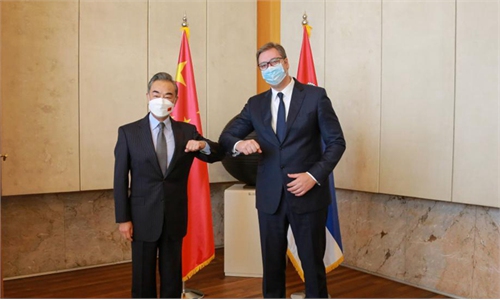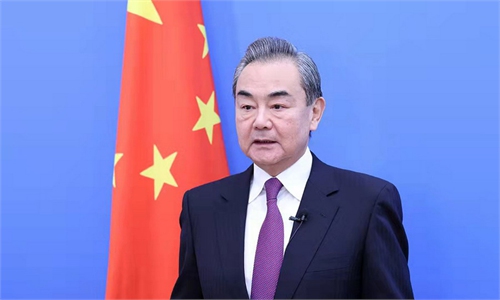Estonian FM stresses one-China principle in meeting with Wang Yi, in sharp contrast to Lithuania

Wang Yi Photo:Ministry of Foreign Affairs
Chinese State Councilor and Foreign Minister Wang Yi held a virtual meeting with Estonian Foreign Minister Eva-Maria Liimets at her request on Monday, with Liimets stressing that the country will continue to adhere to one-China principle, in an obvious contrast to its neighbor Lithuania.
Experts believe that Estonia is setting a positive example of the importance of diplomatic autonomy and mutual benefits, and the meeting would help to wane negative influence from Lithuania.
2021 marks the 30th anniversary of the establishment of diplomatic ties between China and Estonia. Wang said the experience of China-Estonia exchanges shows that as long as the two countries respect each other and treat each other as equals, the two sides can achieve mutual benefits and win-win results.
Wang said the two countries should continue to pay attention to each other's legitimate concerns on core interests, abide by the norm of non-interference in internal affairs of international relations and maintain the political foundation of bilateral relations.
Liimets said Estonia attaches great importance to relations with China and will continue to firmly adhere to one-China principle. She also stressed that Estonia supports China in hosting the Beijing 2022 Olympic and Paralympic Winter Games and believes the Games will be a success.
Also on Monday, Lithuanian media reported that Lithuanian Economy and Innovation Minister Ausrine Armonaite expressed concern about the country's investment environment. She said foreign investors may change their investment plans in Lithuania because of the country's relationship with China.
China downgraded its diplomatic relations with Lithuania in November 2021 after the country nodded to Taiwan secessionist authority's idea of setting up a representative office in the name of Taiwan. Lithuania and its backer US initially tried to hold the EU's position hostage on the issue, but then faced widespread opposition both at home and in the EU.
Chinese Foreign Ministry spokesperson Zhao Lijian said on Monday that Lithuania's attempt to use its own mistakes to kidnap China-EU relations for its own selfish gains is both irresponsible and dangerous.
In sharp contrast to Lithuania's provocation over the Taiwan question, Estonia said it will expand areas of cooperation with China.
Wang suggested that the two countries should expand cooperation in agricultural products, e-commerce and digital economy. And China will continue to uphold its opening-up policy and welcome Estonian companies to China and share development opportunities.
The Chinese Foreign Ministry said in its statement that the two countries agreed to maintain communication, hold diplomatic and political consultations at an appropriate time and speed up the signing process of the protocol on the export of Estonian dairy products and wild aquatic products to China.
The Global Times found that non-interference in each other's internal affairs was also stressed twice by Wang, who said China is ready to work with Estonia to inject more factors of stability into the international environment full of uncertainty and instability.
Wang said China and the EU are partners rather than rivals. The differences between systems do not mean confrontation. And China always supports the EU in playing a bigger role in international affairs and strengthening its strategic autonomy.
Liimets said Estonia supports EU-China cooperation and believes that sound EU-China relations are also conducive to promoting relations between EU member states and China.
China's development of relations with Estonia, a member of the EU and NATO, shows that unlike some countries, China is not interested in wooing allies and major powers, Li Haidong, a professor at the Institute of International Relations of the China Foreign Affairs University, told the Global Times on Tuesday.
The development of equal and mutually beneficial relations between any country and China should be based on mutual concern for each other's core interests. Estonia respects the one-China principle, and mutual benefit will follow naturally, Li said.
Analysts said the diplomatic achievements made by China and Estonia serve as a warning to Lithuania: as Baltic countries, their interests are not bound together, and Estonia's rationality and diplomatic autonomy allow it to obtain a completely different result from Lithuania, which blindly prioritized US interests, ignored the interests of its own people and European solidarity, and made itself a disposable tool of the US.
It is hoped that European countries will judge from the Estonian and Lithuanian stories that a country with strong autonomy can better defend its own interests, Li said, noting that Estonia is a positive example within the EU in handling ties with China, which will weaken some of the unfriendliness toward China in Europe.



